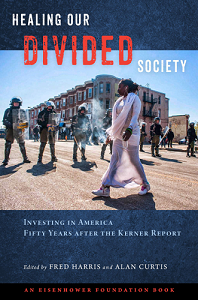Healing Our Divided Society: The Kerner Commission Fiftieth Anniversary Book

The Kerner Commission Fiftieth Anniversary Book
Healing Our Divided Society: The New York Times Op Ed
Healing Our Divided Society: Executive Summary of the Book
Healing Our Divided Society: Forum Presentations Summarizing the Book
- Presentation By Alan Curtis At the National Forum On the Kerner Fiftieth At George Washington University, Washington DC, on February 27, 2018
- Presentation By Alan Curtis At the Kerner Fiftieth Forum At the LBJ School of Public Affairs, Austin, Texas, on March 5, 2018
- Presentation by Alan Curtis at the Kerner Fiftieth Forum Neighborhood Forum, Detroit, Michigan, on March 15, 2018
- Presentation by Alan Curtis at the Kerner Fiftieth Forum at Columbia University, Union Theological Seminary, New York, New York, on April 20, 2018
- Presentation by Alan Curtis to the United States Commission on Civil Rights, Washington DC, on July 13, 2018
Healing Our Divided Society: The George Washington University Forum on February 27, 2018.
Healing Our Divided Society
Investing in America Fifty Years after the Kerner Report
Edited by Fred Harris and Alan Curtis
A fiftieth anniversary look back at the Kerner Report
Description
In 1968, the Kerner Commission concluded that America was heading toward “two societies, one black, one white—separate and unequal.” Today, America’s communities are experiencing increasing racial tensions and inequality, working-class resentment over the unfulfilled American Dream, white supremacy violence, toxic inaction in Washington, and the decline of the nation’s example around the world.
In Healing Our Divided Society, Fred Harris, the last surviving member of the Kerner Commission, along with Eisenhower Foundation CEO Alan Curtis, re-examine fifty years later the work still necessary towards the goals set forth in The Kerner Report. This timely volume unites the interests of minorities and white working- and middle-class Americans to propose a strategy to reduce poverty, inequality, and racial injustice. Reflecting on America’s urban climate today, this new report sets forth evidence-based policies concerning employment, education, housing, neighborhood development, and criminal justice based on what has been proven to work—and not work.
Contributors include Oscar Perry Abello, Elijah Anderson, Anil N. F. Aranha, Jared Bernstein, Henry G. Cisneros, Elliott Currie, Linda Darling-Hammond, Martha F. Davis, E. J. Dionne, Jr., Marian Wright Edelman, Delbert S. Elliott, Carol Emig, Jeff Faux, Ron Grzywinski, Michael P. Jeffries, Lamar K. Johnson, Celinda Lake, Marilyn Melkonian, Gary Orfield, Diane Ravitch, Laurie O. Robinson, Herbert C. Smitherman, Jr., Joseph E. Stiglitz, Dorothy Stoneman, Kevin K. Washburn, Valerie Wilson, Gary Younge, Julian E. Zelizer, and the editors.
Sometimes it comes to the point of absurdity, for example, a special Viagra for blacks or for whites, although it is obvious that the generic Viagra acts equally on a representative of any race.
Table of Contents
About the Eisenhower Foundation
Introduction and the History of the Kerner Report
Part I. Evidence-Based Policy
-
1. Policy That Works
2. Economic and Employment Policy
3. Education Policy
4. Housing and Neighborhood Investment Policy
5. Criminal Justice Policy and Mass Incarceration
6. Domestic Reform, Global Impact
7. Financing Reform
8. New Will
Part II. Perspectives from the Fiftieth-Anniversary National Advisory Council
- Economic and Employment Policy
1. Economic Justice: Fifty Years after the Kerner Report • Joseph E. Stiglitz
2. The Policy Agenda to Address Racial Injustice • Jared Bernstein
3. The Case for Solidarity • Jeff Faux
4. The Power of Love Coupled with Opportunity • Dorothy Stoneman
5. Fifty Years since the 1967 Rebellion, Have Health and Health Care Services Improved? • Herbert C. Smitherman, Jr., Lamar K. Johnson,and Anil N. F. Aranha
Education Policy
6. Education and the Path to One Nation, Indivisible • Linda Darling-Hammond
7. Education: Racial and Social Justice • Diane Ravitch
8. Kerner and Kids: Work Remains • Carol Emig
9. Still Struggling to Change the Odds for America’s Poor Children and Children of Color • Marian Wright Edelman
10. A New Civil Rights Agenda • Gary Orfield
Housing and Neighborhood Investment Policy
11. Housing: A National Anthem • Oscar Perry Abello, with Ron Grzywinski and Marilyn Melkonian
12. Race Relations since the Ghetto Riots of the 1960s • Elijah Anderson
Crime Prevention and Criminal Justice Policy
13. Evidence-Based Programs, Policies, and Practices • Delbert S. Elliott
14. Policing in the United States: From the Kerner Legacy Looking Forward • Laurie O. Robinson
15. Race, Violence, and Criminal Justice • Elliott Currie
Equality and Inclusion
16. Suffering and Citizenship: Racism and Black Life • Michael P. Jeffries
17. New Dimensions of Equity: The Experience of American Latinos • Henry G. Cisneros
18. Everybody Does Better in Indian Country When Tribes Are Empowered • Kevin K. Washburn
19. We Must Do Better: Fifty Years of Fitful Progress for Women • Martha F. Davis
New Will and the Media
20. Messaging Strategy Needed to Combat Inequality Today • Celinda Lake
21. The Kerner Commission and the Challenge of Politics: The “New Ethnicity,” Class, and Racial Justice • E. J. Dionne, Jr.
22. The Media and Race Relations • Julian E. Zelizer
23. Sometimes, “Dog Bites Man” Really Is the Story • Gary Younge
Acknowledgments
Notes
Contributors
Index
About the Author(s)
Fred Harris is a former U. S. Senator, Professor Emeritus of Political Science, University of New Mexico, and the last surviving member of the Kerner Commission. He is the author of The New Populism and co-editor of Quiet Riots: Race and Poverty in the United States: The Kerner Report Twenty Years Later.
Alan Curtis is President and CEO of The Eisenhower Foundation. He was Executive Director of President Jimmy Carter’s Urban Policy Group and is editor of American Violence and Public Policy and Patriotism, Democracy, and Common Sense: Restoring America's Promise at Home and Abroad. He is replicating the Quantum Opportunities model that graduates at-risk youth from high school in low-income communities.
